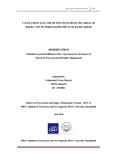| dc.contributor.advisor | Ahmed, Dr. Md. Saleh | |
| dc.contributor.author | Hossain, Mohammad Anwar | |
| dc.date.accessioned | 2017-02-02T06:58:57Z | |
| dc.date.available | 2017-02-02T06:58:57Z | |
| dc.date.copyright | 2016 | |
| dc.date.issued | 2016-06 | |
| dc.identifier.other | ID 14182002 | |
| dc.identifier.uri | http://hdl.handle.net/10361/7723 | |
| dc.description | This dissertation is submitted in partial fulfillment of the requirements for the degree of Masters in Procurement and Supply Management, 2016. | en_US |
| dc.description | Cataloged from PDF version of thesis report. | |
| dc.description | Includes bibliographical references (page 59-63). | |
| dc.description.abstract | Potato plays a significant role in increasing food security and income of the farmers of
Bangladesh. It is an important vegetable for its commercial and nutritional value in the world as
well as in Bangladesh. The value chain of potato is not well organized in Bangladesh. This study
was carried out to analyze the existing value chain of potato in two selected districts of
Bangladesh viz. Bogra and Munshiganj. It’s an attempt to assess the existing potato value chain
with the help of primary and secondary data. Primary data were collected from the potato
growing area of Kahaloo upazila under Bogra district and Sadar Upazila of Munshiganj district.
Potato value chain actors were selected from both the upazilas. Twenty farmers, forty traders and
three cold storage owners were selected through simple random sampling, purposive sampling,
and simple random sampling procedure, respectively. Simple descriptive methods were used to
analyze the data. The primary data were collected through the direct interview method with the
help of pretested questionnaires during the month of February to April 2016. In the production
and marketing system of potato, many value chain actors were involved such as farmers, Faria,
Bepari, wholesaler, retailer and cold storage owner. Marketing of potato produced in Kahaloo
Upazila was moved from the hands of producers to the hands of consumers through five separate
chains. Highest sales price per 40Kg of potato received by retailer was Tk. 818.50 and the lowest
sales price received by farmer was Tk. 480.38. In the value chain, highest value (33.13 percent)
was added by wholesaler and lowest value (14.23 per cent) was added by Faria of the total value
addition. Comparison of price fluctuation of potato in Bogra and Dhaka market was relatively
correlated. The present study found some problems of the existing potato production and
marketing system. Potato growers did not get fair price due to lack of economic storage facilities,
existence of stronger middlemen, inefficient transportation facilities, and lack of proper
marketing information and urgent requirement of money immediately after the potato harvesting
period by the farmers. Based on the findings of the present study, it was recommended that
institutional credit, timely supply of inputs, application of modern production and postharvest
technologies and stability of price should be ensured along with the provision of storage,
transport and market facilities. | en_US |
| dc.description.statementofresponsibility | Mohammad Anwar Hossain | |
| dc.format.extent | 75 pages | |
| dc.language.iso | en | en_US |
| dc.publisher | BRAC University | en_US |
| dc.rights | BRAC University dissertation reports are protected by copyright. They may be viewed from this source for any purpose, but reproduction or distribution in any format is prohibited without written permission. | |
| dc.subject | Potato | en_US |
| dc.subject | Value chain | en_US |
| dc.title | Value chain analysis of potato in selected areas of Bogra and Munshigonj districts of Bangladesh | en_US |
| dc.type | Thesis | en_US |
| dc.contributor.department | BRAC Institute of Governance and Development, BRAC University | |
| dc.description.degree | M. Procurement and Supply Management | |

